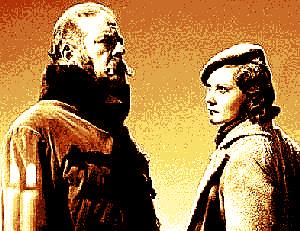Film Review
With its atmospheric chiaroscuro photography, impressive cast and
meticulous attention to period detail (not to mention some
stunning montage WWI battle sequences),
Les Nuits moscovites has a lot to
recommend it. The film was directed by Alexis Granowsky, one of a
number of Russian exile filmmakers who worked in France in the 1930s;
he is perhaps best known for his 1936 film
Tarass Boulba.
One of the biggest stars in French cinema at the time, Harry Baur is
perfectly cast as the almost irredeemably bad Brioukov, the kind of
substantial character role in which he excelled. Opposite Baur
are two other popular actors of the period, Annabella and Pierre
Richard-Willm, who each turns in an engaging and truthful performance.
The popular chansonnier Tino Rossi makes his film debut in a small
singing role. Two other actors of note are Roger Karl and Spinelly,
who are both excellent in their supporting roles. It is a prestigious cast
list which reflects the
quality of the film's production values.
An English version of this film was made one year later, directed by
Anthony Asquith and entitled
Moscow
Nights. Harry Baur again plays the part of Brioukov, his
first appearance in an English film, with Pierre Richard-Willm and
Annabella replaced by Laurence Olivier and Penelope Dudley-Ward (the
future wife of Carol Reed).
© James Travers 2008
The above content is owned by frenchfilms.org and must not be copied.
Film Synopsis
Moscow, 1916. To restore her family's wealth and reputation,
Natasha Kovrine agrees to become engaged to the wealthy grain merchant
Brioukhov, even though he is many years her senior. At the
hospital where she works as a nurse, Natasha meets and falls in love
with one of her patients, Capitain Ignatov, a young officer in the
Russian imperial army. When he has recovered from his injuries,
Ignatov is posted to the military supplies office, where he immediately
comes into conflict with Brioukhov. Then, at the card table,
Ignatov loses to his rival an amount of money that he cannot possibly
repay. His only hope is the wealthy Anna Sabline, who offers to
pay his debts in exchange for a small service...
© James Travers
The above content is owned by frenchfilms.org and must not be copied.



